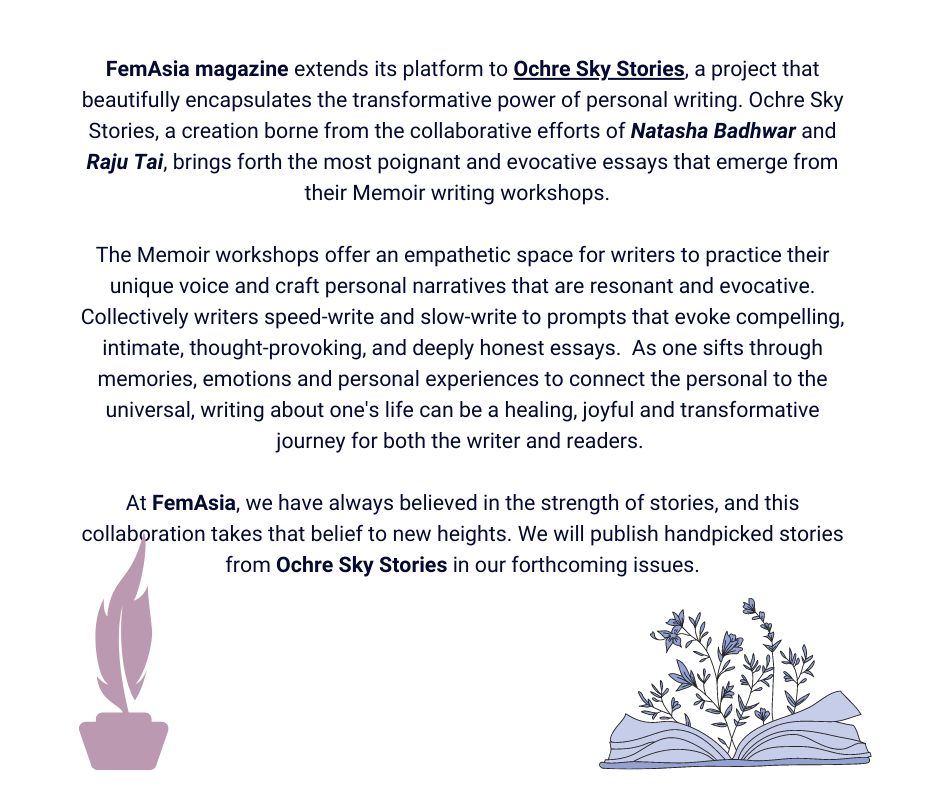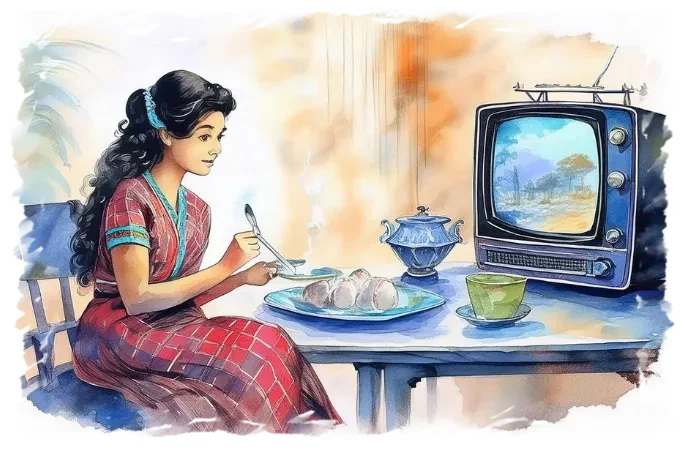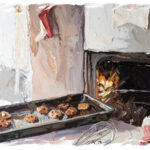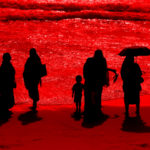It was post lunch break. The History period. Our teacher had just begun addressing our class. Out of the blue, one of the trustees of our school, a silver-haired hulk of a man, strode in with a cane in his hand. It meant trouble. Standing at the head of the class with his thick white eyebrows knitted into a frown, his borer eyes scanning every face, he thundered, “How many of you have seen ‘Bobby’?” The moment he mentioned the film, the song “Hum tum, ek kamre mein band ho, aur chaabi kho jaaye,” began to play in my mind on a loop. I could not meet the trustee’s eyes, and I could feel my body shake. I had not only watched ‘Bobby’, I had loved it too. I so wanted to have a dimple (later, I came to know it was called a cleft) on my chin. I poked my chin and my cheeks with a pointed pencil several times a day in the hope that the constant jabbing would create a depression.
For every Dassera, my grandfather, Ajjo, bought new clothes for me and my cousin Reshma. That year, I insisted I wanted the red Bobby dress with a belt and two pockets that had become a rage. He bought a red and yellow checked version for me and a red and blue one for Reshma. The dresses were longer than the mini dress the beautiful Dimple Kapadia had worn in the film. Reshma and I felt so hip. We gave each other a high five and broke into peals of laughter. I shuddered to think that our school trustee may have spotted me in those clothes or at Chitra theatre where I had watched the film. Many of my classmates had watched it too but were tight-lipped now. One of them, Anuradha, stood up and looked straight into the trustee’s eyes. Emboldened, three boys stood up too. “I have seen ‘Bobby’,” Anuradha confessed in a smooth voice. The boys nodded their heads in acknowledgement. Marching up to them, the trustee caned the four ‘miscreants’ on their palms. Anuradha did not flinch. The trustee warned the rest of us ‘good’ children, “Don’t you dare watch that dirty film. If we come to know that you have, we will take strict action.” By then, my heart was thudding inside my chest. I also felt like a wimp. I looked at Anuradha with instant admiration. She had the guts to speak the truth. During recess, I asked her, “Were you not scared of the punishment? How could you be so bold?” “Why should I be scared? My parents took me to watch the movie. They were okay with me seeing it. Just one rap of the cane. It’s no big deal,” she replied, brushing off the incident that had traumatised the rest of us. I so wanted to be like Anuradha—dashing, defiant, honest. To do what you wanted to do, whatever anyone else thought about it, especially if you had your parents’ support. I learnt that conviction came with consequences and one had to bear them. That day, Anuradha and the three boys sat with their chins up while the rest of us hung our heads in shame not because we had watched ‘Bobby’, but because we hadn’t owned up.
This was the time when most of the girls in our class had begun menstruating, and wearing pointy cotton bras. Twelve was the age when you began to blossom. The class was divided into those who had grown up and those who were still bacchas. I was the latter, so was my best friend, Veena. We were frightfully thin during times when thin was not in. Often, well-meaning relatives asked Amma, “Don’t you give her anything to eat?” That made Amma go on the defensive and complain, “Oh, what to do, she just does not eat only.” She wasn’t entirely wrong. I liked everything that wasn’t considered healthy. I dipped brun paav slathered with white butter into hot tea and gobbled it up. I could polish off a packet of Gluco biscuits in a jiffy. I ate large chunks of Amul cheese that my uncle, a cricket coach, stored in a large steel dabba in the fridge. I wasn’t fond of vegetables. I loved papads, fried chillies, and bajjos, while I ignored all the delicious food that my grandmother, my Mamama, cooked and cajoled me to eat. The spicier and more pungent the food was, the better, which prompted Mamama to say in my mother tongue, Konkani, “Tukka kaaylya jeebh assa. You have a crow’s tongue.”
Later, in college, a friend’s mother called me the haath agarbatti, paanv mombatti girl, a description so apt I couldn’t help but laugh. Today, it would be considered pejorative. I did not get my periods till I turned fifteen, and it worried Amma terribly. The girls in our class occasionally slid their palms on our backs to check if we had begun wearing bras and were not coming out as menstruating girls. Veena and I did not miss being part of the mature gang that moaned with menstrual cramps every month and wore Comfit sanitary napkins.
One day, another classmate, Meena, whose father was a chemistry professor, stunned us with her revelation. We had just finished eating our dabbas, and were sitting in a circle on our desks. “Do you know?” she asked in a conspiratorial tone. “Our parents get married to do dirty dirty things.” All of us looked at each other, rather agitated by the attribution of dirty activity to our parents. Though my father was long dead, I could not imagine Amma doing anything dirty. We chorused that we certainly did not think so. “Even our grandparents have done dirty dirty things,” she continued. That made a pair of twins, who were part of the group, very angry. “Your parents and grandparents may have done dirty dirty things, ours haven’t,” they hollered. Unfazed by the outburst, Meena said, “One day you will all come to know.” Her smirk left me thinking all week about what the dirty dirty things could be. I observed Amma and my grandparents closely for evidence but found none. Either Meena had acquired some secret knowledge or she was lying. At twelve, we were so innocent. We knew nothing about sex. Also, there were other things on my mind.
Often relatives cupped my chin and asked, “Archu, what do you want to be when you grow up?” I had no clue. I had begun writing rhyming poetry in third grade. Though I did not keep a regular diary, I did jot down quotes and words and tiny notes on interesting stuff I came across. The lure of films was great. I wanted to look beautiful, become rich and famous. Perhaps, I mused, I could be an actress. Amma wanted me to be a doctor. Though I loved Biology and was fascinated by the human body, I knew I would never become one. Mamama had other ideas. We were still in the aftermath of the third Indo-Pak war. Bangladesh had been liberated. Indira Gandhi had attained the status of a goddess. “You should be like her. Like Durga. Fearless,” she said. I had begun admiring Indira Gandhi, but I was so afraid of the dark. How could I be like her? Amma had taught me the Ram Raksha Stotra. “It will protect you wherever you are,” she had assured me. But chanting it did not take away my fear of ghosts or stop my nightmares. Mornings were better. Sunlight made me brave. As the coconut palms swayed in the adjoining compound, the Champa blooms glowed like tiny bulbs on the tree outside my window, and I buried my nose in Enid Blyton, Hardy Boys, and comics like Phantom, Mandrake, Richie Rich, Audrey, Lotta, Sad Sack, Archie, and the Children’s World magazine, I felt that all was well with the world. At twelve, I did not know how wrong I was.
This work was written during the Ochre Sky Memoir writing workshop facilitated by Natasha Badhwar and Raju Tai.




